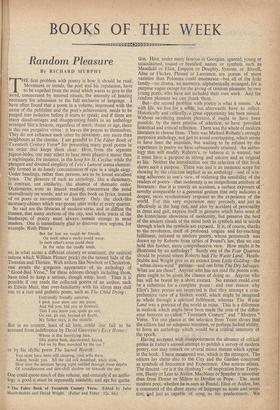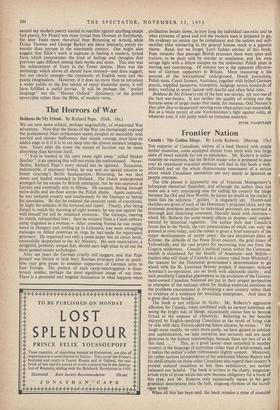BOOKS OF THE WEEK
Random Pleasure
By RICHARD MURPHY HE first problem with poetry is how it should be read. Movement or trends, the poet and his reputation, have to be expelled from the mind which wants to give to the word, consecrated by internal rituals, the intensity of hearing necessary for admission to the full eucharist of language. I have often found that a poem in a volume, impressed with the name of the publisher and the poet's achievement, needs to be purged into isolation before it starts to speak; and if there are many disadvantages and disappointing faults in an anthology, arranged likea lexicon, regardless of merit, theme or age, there is this one purgative virtue : it leaves the poems to themselves. They do not influence each other by proximity, any more than neighbours at the cinema. I am grateful to The Faber Book of Twentieth Century Verse* for presenting many good poems in an order that keeps them clear. Here, from the separate pigeon-holes, one may select to hear more plaintive music than a nightingale, for instance, in the Song for St. Cecilia; while the plangent and doomed simplicty of Tess's Lament seems element- ally formed in its lonely concentration of epic in a single elegy. Under headings, rather than persons, are to be found excellent lyrics. The pleasure of such an anthology, like a dictionary, is contrast, not similarity, the absence of thematic order. Dictionaries, even as leisure reading, concentrate the mind marvellously on words; and so does this book on lyrics, instead of on poets or movements or history. Only the clock-like mortuary-chimes which war-poems utter strike at every quarter. • So vast are the libraries of modern verse, and so diffuse the themes, that many sections of the city, and whole tracts of the landscape, of poetry must always remain strange to most readers. One is immediately glad to discover new regions, for example, Ruth Pitter's
But for lust we could be friends, On each other's necks could weep: In each other's arms could sleep In the calm the cradle lends,
or, in what seems a different century or continent, the satirical • tattoos which William Plomer pricks on the tanned hide of the Twenties and Thirties. With writers like Newbolt or Chesterton, one awaits the gorgeous appearance of an anthology of " Good-Bad Verse," for these editors; though including them, have tried to keep a serious, though witty, level. Then it is possible if one reads the collected poems of an author, such as Edwin Muir, that over-familiarity with his idiom may dull one to a rare and pathetic poem, such as The Child Dying: Unfriendly friendly universe, I pack your stars into my purse, And bid you, bid you so farewell. That I can leave you, quite go out, Go out, go out, beyond all doubt, My father says, is the miracle.
But in no context, least of all here, could One fail to be • arrested from indifference by David Gascoyne's Ecce Homo:
Whose is this horrifying face, This putrid flesh, discoloured, flayed, Fed on by flies, scorched by the sun ?
or by his idyllic poem The Sacred Hearth:
You must have been still sleeping, your wife there
Asleep beside you. All the old oak breathed: while slow, How slow the intimate Spring night swelled through those depths Of soundlessness and dew-chill shadow on towards the day.
One could quote much of this volume, and certainly if an antho- logy is good it must be repeatedly readable, and apt for quota- * The Faber Book of Twentieth Century Verse. Edited by John .Heath-Stubbs and David Wright. (Faber and Faber. 12s. 6d.) tion. Here, under many famous or Georgian, ignored, young or unacclaimed. touted or beatified names or symbols such as Masefield or Eliot, Empson or Doughty, Symons or Sitwell, Abse or Flecker, Plomer or Lawrence, are poems of more varieties than Polonius could enumerate—but all of the lyric family—no drama, no narrative, alphabetically arranged, for a purpose vague except for the giving of random pleasure, by two young poets, who have not included their own work. And for random pleasure we can thank -them. But—the second problem with poetry is what it means. As with life, we live for a while, but afterwards have to reflect. Historically and critically, a great opportunity has been missed. Without sacrificing random pleasure, it ought to have been possible, by the mere process of selection, to have provided historical and critical reflection. There was the whole of modern literature to choose from. There was Michael Roberts's strongly purposive anthology, not just to avoid overlapping, which seems to have been the intention, but waiting to be refuted by the experience in poetry we have subsequently attained. An antho- logy that will modify Roberts's, or balance it, is wanted, but it must have a purpose as strong and sincere and as original as his. Neither the introduction nor the selection of this book shows such a purpose. There was and is an immense scope for showing by the criticism implicit in an anthology—and of win- ning adherents to one's view, of widening the sensibility of the readers of poetry—that modernity is an insignificent attribute of literature : that it is merely an accident, a surface exposure of novelty comparable to a personal gesture, that only indicates a deeper, more revolutionary response to the experience of the wcirld. For this very experience may precisely, and just as effectively in the long run, and also by accident of personality in dress and gait, express itself in gestures whict have none of the iconoclastic showiness of modernity, but preserve the best of the ancient rituals of the mind both in symbols and in words through which the symbols are exposed. It is, of course, thanks to the revolution, itself of profound origins and far-reaching fulfilment, initiated in modern poetry, whose pentateuch was drawn up by Roberts from tables of Pound's law, that we can hold this further, more comprehensive view. How might it be illustrated by an anthology? Surely one of the Four Quartets should be printed where Roberts had The Waste Land. Heath- Stubbs and Wright give us an extract from Little Gidding—the "urban dawn-wind "passage—and one from The Dry Salvages. What use are these? Anyone who has not read the poems com- plete ought to be given the chance of doing so. Anyone who has will be bored by a short extract. No extract could ever be a substitute for a complete poem : and one reason why Eliot's later poems are respected is that they attempt a com- prehensive view of a broken world, which might be imagined as whole through a spiritual fulfilment, whereas The Waste Land was a portrait of the world in ruins. This is a difference in outlook which might have been made the core of the differ- ence between so-called." Twentieth Century" and " Modern " Verse. Yet one glance at the selection from Yeats shows that the editors had no adequate intention, or perhaps lacked ability, to form an anthology which would be a critical summary of the epoch. Having accepted with disappointment the absence of critical genius in Faber's second attempt to publish a survey of modern poetry, one may remark on several minor themes which appear in the book. I have mentioned war, which is the strongest. The editors lay claim also to the City and the Garden conceived as symbols of Innocence and Experience. One notices others. The descent—or is it the climbing?—of inspiration from Tenny- son, Hardy or Lear to Auden, MacNeice or Spender is smoother than from Donne or Milton to Dryden or Pope. The most modern poet, whether he is seen as Pound, Eliot or Auden, has a command of the sheer music of language as acute and sensi- tive, iind just as capable of song, as his predecessors. We
cannot say modern poetry started in reaction against anything except bad poetry, for Pound was more lyrical than Dowson or Swinburne, the later Yeats more rhetorical than Browning or Arnold, while Dylan Thomas and George Barker are more intensely, purely ro- mantic than anyone in the nineteenth century. One might also suggest that Eliot's work is supreme in finding a modem, lyrical form which concentrates the kind of feelings and thoughts that previous ages diffused among their myths and epics. This also was the achievement of Yeats in the Tower poems. Here was the anthology which above all should have stressed—and does suggest, but not clearly enough—the continuity of English verse and the poetic imagination. However, if it does no more than to introduce a wider public to the fine talents of many dissimilar poets, it will have fulfilled a useful service. It will be perhaps the "pocket language" not the "Shorter Oxford" dictionary, or the potted apocrypha rather than the Bible, of modern verse.

































 Previous page
Previous page